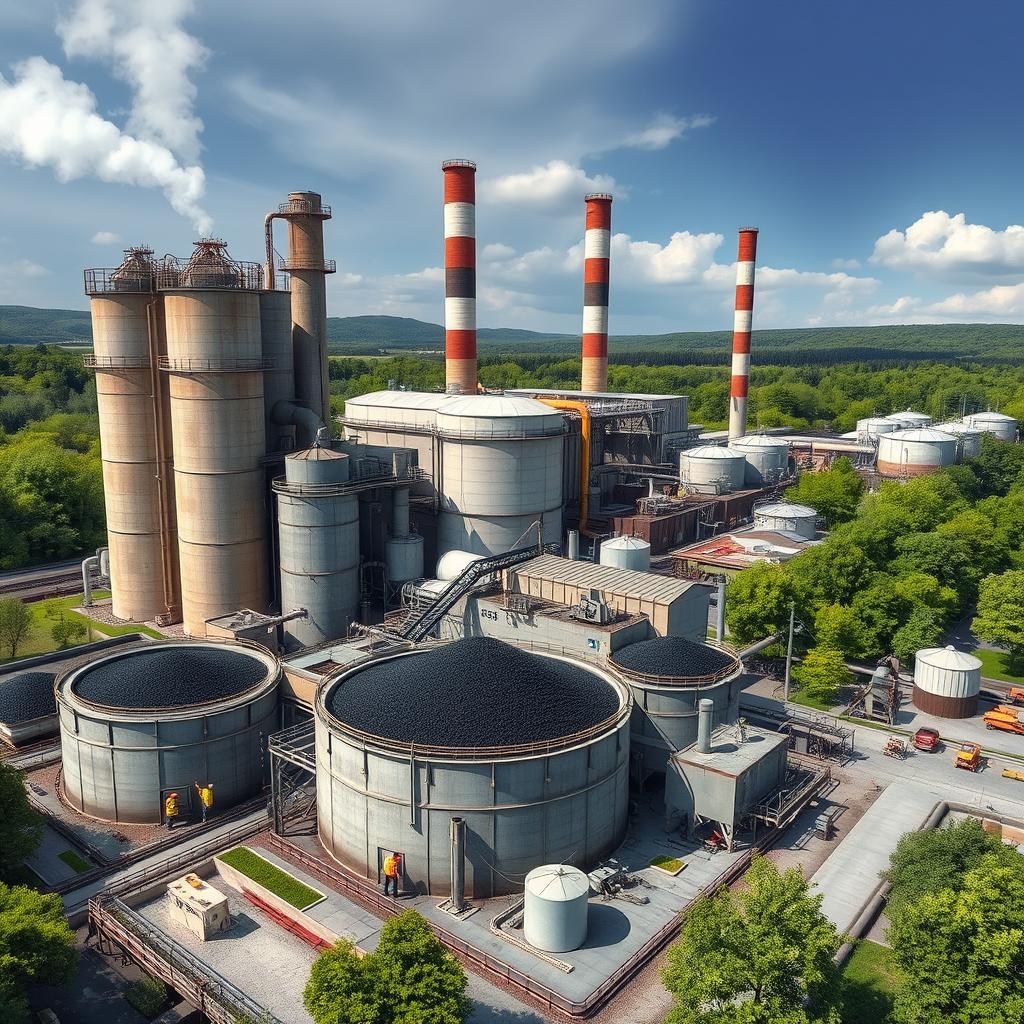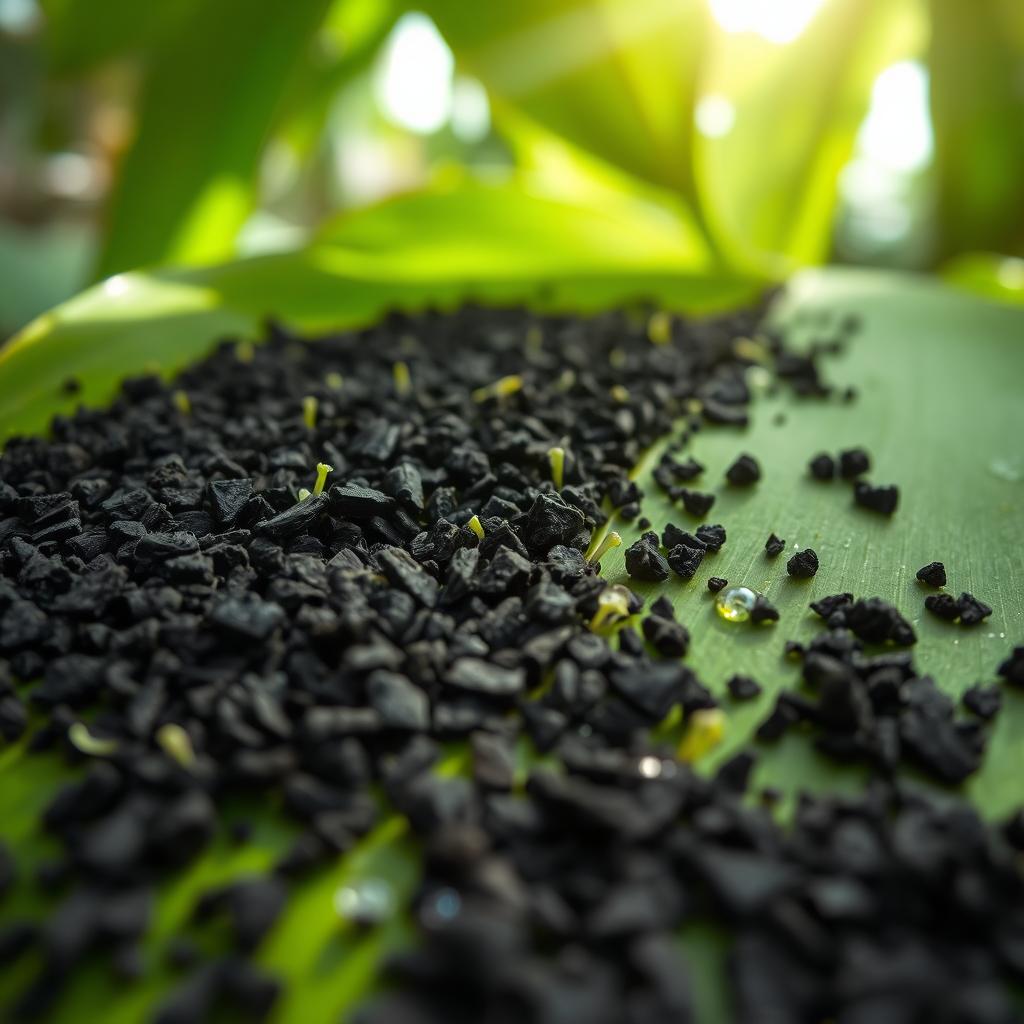How activated charcoal can benefit the environment? Imagine a simple, natural substance that could fight pollution and climate change. Activated charcoal is just that. It’s eco-friendly and can clean the air, water, and soil. As we all try to live greener, activated charcoal is becoming key to a sustainable future.
Activated charcoal’s special powers help remove bad stuff from our environment. It makes our world cleaner and healthier. Plus, it’s good for the planet, making it a top choice for eco-conscious folks. Activated charcoal is a game-changer in the fight against pollution. It cleans the air, water, and soil. This makes it a go-to for those wanting a greener planet.
Click to use Silverigroup personal shopper services
Key Takeaways:
- Activated charcoal has numerous environmental benefits, including air and water purification.
- It is an eco-friendly material with a range of applications, from soil enhancement to pollution control.
- Activated charcoal can be used to remove impurities and toxins from the environment.
- Its unique properties make it an effective agent for reducing environmental pollution.
- By utilizing activated charcoal, individuals can contribute to a cleaner, healthier environment.
- Activated charcoal is a valuable tool in the pursuit of a more sustainable future.
Understanding Activated Charcoal’s Environmental Properties
Activated charcoal has a special chemical structure. It works well for cleaning and filtering. Its big surface area and holes help it catch pollutants. This makes it great for helping the planet. How activated charcoal is made can harm the environment. That’s why making it in a green way is key. Green methods use natural materials, cut down on waste, and save energy. For example:
- Using coconut shells or bamboo as raw materials
- Implementing energy-efficient kilns and drying systems
- Utilizing solar or wind power to generate energy
Click to buy citric acid from Silvairgroup
Using these green methods helps reduce harm to the environment. Activated charcoal is perfect for many uses. It cleans air and water, and even helps the soil. More research shows activated charcoal’s benefits. Its special chemical structure and green making help our planet. Using activated charcoal can lead to a greener future.
Air Purification and Pollution Control
Activated charcoal filters are key in air purification. They catch pollutants and allergens, making air better indoors and outdoors. This helps our health and the planet. Studies show activated charcoal is great for cleaning the air. Activated charcoal filters have many benefits for air purification:
- They remove harmful gases like VOCs.
- They trap dust and pollen.
- They get rid of bad smells.
Adding activated charcoal filters to air systems makes homes and offices healthier. It’s a simple way to control pollution and clean the air. The need for air purification and pollution control is huge. Activated charcoal filters are a big help. As more research supports its use, it will help make our air cleaner and healthier for everyone.

Water Filtration and Conservation Benefits
Activated charcoal is key in water filtration, offering many conservation benefits globally. It helps remove heavy metals and organic pollutants from water. This makes drinking water clean and safe for everyone. Removing heavy metals is vital for health and the environment. Activated charcoal is great at taking out harmful substances like lead, mercury, and arsenic. It does this by adsorbing these metals, keeping them out of our water.
- It removes heavy metals and organic pollutants.
- It improves water taste and smell.
- It cuts down on chlorine and other harmful byproducts.
In summary, activated charcoal in water filtration systems is a simple yet effective way to clean water. It helps make drinking water better, which is good for conservation benefits and public health.
Soil Enhancement and Agricultural Applications
Activated charcoal boosts soil quality, making it great for sustainable farming. It makes soil more fertile, grows more crops, and cuts down on environmental harm. This is because it holds water and nutrients, so you don’t need to fertilize or water as much. In agricultural applications, activated charcoal helps soil, grows more crops, and fights off diseases. It also cleans irrigation water, lowering disease risks. Key benefits include:
- Improved soil fertility
- Increased crop yields
- Reduced soil erosion
- Improved water quality
Activated charcoal in soil enhancement and agricultural applications can greatly help the environment. Farmers can lessen their environmental impact while keeping or boosting production. As we face sustainable farming challenges, activated charcoal’s role will grow. Activated charcoal is a game-changer in agricultural applications. Its many benefits and potential to help the environment make it exciting. As research finds more about activated charcoal, we’ll see more of it used in farming.
| Benefits of Activated Charcoal in Agriculture | Description |
|---|---|
| Improved Soil Fertility | Activated charcoal can improve soil fertility by retaining water and nutrients |
| Increased Crop Yields | Activated charcoal can increase crop yields by reducing soil-borne diseases and improving soil structure |
| Reduced Soil Erosion | Activated charcoal can reduce soil erosion by improving soil structure and increasing water retention |

How Activated Charcoal Can Benefit the Environment Through Carbon Sequestration
Activated charcoal is great for carbon sequestration. This means it captures and stores carbon dioxide from the air. It helps reduce greenhouse gas emissions, which is good for fighting climate change. Using activated charcoal for long-term carbon storage helps protect our planet for the next generations.
Activated charcoal is good at storing carbon, which is key for carbon sequestration. Studies show it can keep carbon for a long time. This helps lower greenhouse gas emissions and fights climate change.
Long-term Carbon Storage Potential
Research shows activated charcoal can store carbon for hundreds of years. This makes it a great choice for long-term carbon storage. Plus, it can be made from sustainable sources, which helps avoid deforestation and cuts greenhouse gas emissions.
Impact on Greenhouse Gas Reduction
Using activated charcoal for carbon sequestration can really help lower greenhouse gas emissions. It traps and stores carbon dioxide, which reduces the amount of greenhouse gases in the air. This helps cool the planet and fights climate change.
| Carbon Sequestration Method | Carbon Storage Potential | Greenhouse Gas Reduction Potential |
|---|---|---|
| Activated Charcoal | Long-term carbon storage | Significant reduction in greenhouse gas emissions |
Industrial Applications and Environmental Protection
Activated charcoal has many industrial applications that help protect the environment. It is used in various industries to cut down waste and pollution. This promotes sustainable practices. By using activated charcoal, industries can lessen their impact on the environment. Some of the key industrial applications of activated charcoal include:
- Air purification systems to remove pollutants and particulate matter
- Water filtration systems to remove heavy metals and organic contaminants
- Wastewater treatment to reduce chemical and biological pollutants
As industries use more activated charcoal, they help protect the environment. This move towards a sustainable industry is crucial. It helps reduce pollution and waste, making our environment cleaner and healthier.

Marine Ecosystem Conservation Through Activated Charcoal
Activated charcoal is key in saving our oceans. It helps clean the water and protect marine habitats. This is crucial for keeping marine life healthy. Activated charcoal is used in many ways to help our oceans. It removes harmful pollutants and toxins. This keeps the water clean for marine life.
- It takes out heavy metals and pollutants, which is vital for ocean health.
- It protects places like coral reefs and sea grass beds, which are home to many species.
- It keeps marine animals, like fish and mammals, healthy and thriving.
Studies show activated charcoal can clean up to 90% of ocean water. This is great for keeping marine habitats safe. It helps keep the ocean’s delicate balance. In summary, using activated charcoal to protect our oceans is a promising idea. It could help purify the water and protect marine habitats. As we learn more, we might find even more ways to save our oceans.
| Application | Benefits |
|---|---|
| Ocean Water Purification | Removal of heavy metals and pollutants, improved water quality |
| Marine Habitat Protection | Preservation of coral reefs and sea grass beds, support for marine species |
| Marine Ecosystem Conservation | Maintenance of biodiversity, support for ecosystem balance |
Renewable Energy Storage Solutions
The world is moving towards renewable energy, and good storage is key. Activated charcoal is helping a lot in this area. It makes storing energy better, helping us use more renewable energy.
Activated charcoal is being studied for use in batteries. It can make batteries store more energy and charge faster. This is great for renewable energy, which isn’t always available. Using activated charcoal in energy storage has many benefits. These include:
- Improved energy storage capacity
- Increased battery lifespan
- Enhanced sustainable energy integration
Activated charcoal is a big help in making energy storage better. It’s making batteries work better and helping us use more green energy. As we keep moving to renewable energy, good storage will be even more important.
Future Environmental Applications and Research
Research is showing the huge potential of activated charcoal. Future applications in saving our environment are clear. It’s vital to keep studying this area for a greener future. There are many ways to use activated charcoal for good. We could make it more efficiently, find new uses for it, or help fight climate change. Supporting these efforts can lead to a better world for all. Some key areas to focus on include:
- Improving production methods to reduce environmental impact
- Exploring new applications in air and water purification
- Investigating the potential role of activated charcoal in climate change mitigation
By keeping up with environmental research and sustainable innovation, we can reach activated charcoal’s full potential. This will help make our planet a better place for everyone.
Conclusion: Embracing Activated Charcoal for a Sustainable Future
Activated charcoal has many benefits for our environment. It can clean the air and water. It also helps in storing carbon, which is good for the planet. Using activated charcoal can help us live more sustainably. It can improve water quality, make soil better, and even store energy. Adding it to our daily lives can greatly benefit the Earth.
We should use activated charcoal more in our efforts to be green. It can help us create a cleaner, healthier world. Together, we can make a big difference and ensure a better future for everyone.
FAQ: How activated charcoal can benefit the environment
How can activated charcoal benefit the environment?
Activated charcoal helps the environment in many ways. It cleans the air, filters water, and improves soil. It also helps in carbon sequestration and supports sustainable industries.
What are the environmental properties of activated charcoal?
Activated charcoal is special because of its structure and eco-friendly nature. It’s made sustainably and works well with the environment. This makes it great for various environmental uses.
How does activated charcoal help with air purification and pollution control?
Activated charcoal filters can catch pollutants and allergens. This improves air quality indoors and outdoors. Using it in air systems can greatly reduce pollution.
What are the water filtration benefits of activated charcoal?
Activated charcoal removes heavy metals and organic contaminants. It’s also good for treating industrial wastewater. This makes it key for clean drinking water.
How can activated charcoal enhance soil quality and support sustainable agriculture?
Activated charcoal boosts soil fertility and crop yields. It helps farmers be more sustainable. This way, they can reduce environmental harm while keeping productivity high.
What is the potential of activated charcoal for carbon sequestration?
Activated charcoal can store carbon for a long time. This makes it a strong tool for reducing greenhouse gases. Using it helps fight climate change and protect our planet.
How can activated charcoal be used in industrial applications to protect the environment?
Activated charcoal has many industrial uses. It helps reduce waste and pollution. By using it, industries can lower their environmental impact and help the planet.
How can activated charcoal benefit marine ecosystem conservation?
Activated charcoal can clean ocean water and protect marine habitats. This helps reduce pollution’s harm to marine life. It keeps our oceans healthy.
What is the role of activated charcoal in renewable energy storage solutions?
Activated charcoal can improve battery technology. It helps make renewable energy more accessible. This is crucial for a greener future.
What are the future environmental applications and research directions for activated charcoal?
Activated charcoal’s potential is growing, thanks to ongoing research. New uses are being found. This is key for a more sustainable future.

